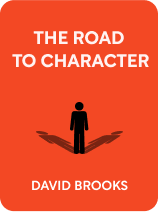

This article is an excerpt from the Shortform book guide to "The Road to Character" by David Brooks. Shortform has the world's best summaries and analyses of books you should be reading.
Like this article? Sign up for a free trial here .
In what ways have morals in society shifted? What is the difference between moral realism and moral romanticism?
In his book The Road to Character, author David Brooks talks about the societal shift from moral realism to moral romanticism. Moral realism is the idea that virtue is made, not born. and moral romanticism is the idea that humans are pure at the core.
Learn the pros and cons of each type of thinking and why societal morality has shifted over the years.
A Philosophical Shift: Moral Realism to Moral Romanticism
If you’re not comfortable with the word “sin,” there are other labels to describe the moral shift that Americans have experienced in the last century. Moral realism is equivalent to the “crooked timber” or “original sin” school of thought, an idea that dates back to Biblical times. Moral realism, a concept that was widely accepted for centuries, stresses that humans are limited by our inherent weaknesses, so we should not trust our own judgment about ourselves. Virtue is made, not born.
But in the 18th century, moral realism was challenged by moral romanticism. Thinkers like Jean-Jacques Rousseau espoused humanity’s inner goodness, stating that at our core, we were pure. Romanticists trusted in anything that was made by Nature, including humans. We can trust our reasoning and self-direction because we have a “golden cure” that is innately good. As such, humans should listen to their inner voices, which will always point them in the right moral direction.
Both worldviews existed side-by-side for many years, with realism more popular among the working class and romanticism embraced by artists and free-thinkers. But by the late 1940s, moral realism fell by the wayside. After being deprived for nearly 20 years—due to the challenges of the Great Depression and World War II—people were ready to indulge in a more positive worldview. There was a pent-up demand for relaxation and enjoyment. Advertising and consumerism started to frame a new way of living (and thinking). Products were being sold (dishwashers, for example) that made life easier, even more frivolous (televisions, for example). The 1952 self-help book The Power of Positive Thinking had a huge impact on how people envisioned their futures. The zeitgeist became, “Go get what you want out of life—you deserve it.” (Shortform note: To learn more about the ideas that caused this shift, read our summary of The Power of Positive Thinking.)
Moral Romanticism Has Some Advantages
Initially, this new emphasis on self-empowerment and self-esteem had positive effects on morals in society.
Many people’s lives were improved by the empowerment movement. The new emphasis on self-actualization had huge implications for improving social injustice, especially for women and minorities. In the 1950s and 1960s, marginalized people chose to stand up for their rights and demand better treatment. Women gained greater personal freedoms and more clout in the workplace. Blacks and other minorities demanded and received more equal rights and opportunities. The federal government was forced to create more inclusive laws and institutions.
(Shortform note: As protests across America have shown, there’s still much work to do to eliminate the oppression of Black people, women, and other minority groups.)
But gradually, Americans’ thinking became solely “me-focused.” The downside of believing so firmly in ourselves was that it led to narcissism. Before long the pendulum had swung from a midpoint balance of moral realism and moral romanticism to a nearly complete shift to the latter. Brooks gives a few examples of this cultural shift:
- As recently as the 1970s, most politicians didn’t publish memoirs. In fact, memoir as a literary genre has only recently gained popularity. Now even low-level politicians publish memoirs soon after leaving office.
- President George Bush Sr. used to cross out the word “I” from his speeches. He didn’t think it was dignified for a U.S. president to speak as an individual. His job was to be the voice of the people, not the voice of himself. But Presidents in more recent history are enamored with the word “I.”
- The first Girl Scout handbooks, published in 1912, emphasized modesty and self-effacement. The 1980 version of the handbook encouraged Girl Scouts to put themselves “at center stage” and pay attention to their feelings.
- In a 1976 survey of people’s life goals, achieving fame was ranked at the bottom (number 15 out of 16 choices). But by 2007, more than half of young people said that being famous was one of their top goals.
The Forgotten Trait: Humility
Moral romanticism’s “me-focus” manifests itself in a loss of humility, a key trait for character-building. As recently as the 1940s, Americans admired humility and looked down on narcissism and self-promotion. For example, when World War II ended, Americans were jubilant but also humble. We handled our success in the war with appropriate gravitas—we had just participated in a horrible period of history marked by death and destruction, so it didn’t seem right to blow our horns in celebration even though we were “victorious.” In contrast, in today’s world, every time a football player scores a touchdown, he dances a victory jig in the end zone (to the great delight of TV cameras and fans).
What’s Lost in Choosing “Me” Over “We”
In addition to making us unhappy, our “me-focused” thinking and achievement-oriented mindset has created a huge societal loss—we no longer focus our energies on helping out our communities, aiding those less fortunate than us, or working in public service. Today we prioritize actions that serve our own good over the greater good. We think in terms of “how can I live my life to get exactly what I want?” But that’s a very different question than asking ourselves,“What does the world need that I can offer?” or “What does life want from me?”
(Shortform note: This idea echoes John F. Kennedy’s famous line from his inaugural address: “Ask not what your country can do for you, but what you can do for your country.” He was challenging every American to contribute in some way to the public good. And long before JFK, Thomas Jefferson said “there is a debt of service from every man to his country.”)

———End of Preview———
Like what you just read? Read the rest of the world's best book summary and analysis of David Brooks's "The Road to Character" at Shortform .
Here's what you'll find in our full The Road to Character summary :
- How the world has become "me-focused" rather than "we"
- An analysis of eight historical figures who selflessly contributed to the greater good
- A 15-point plan to help you live a more virtuous and happy life






